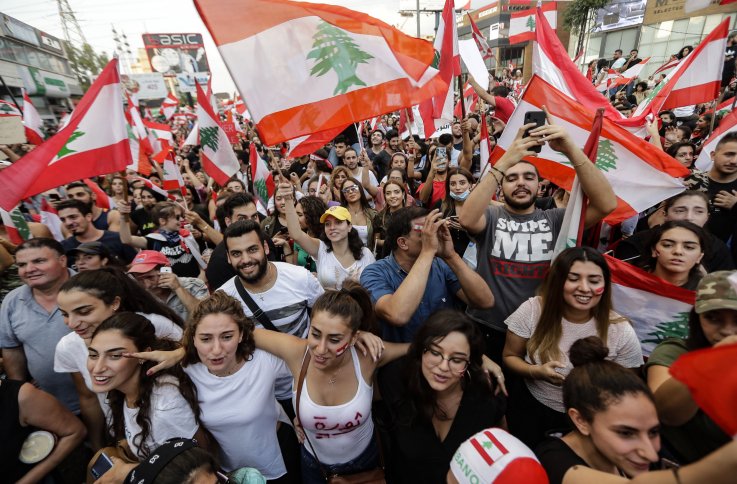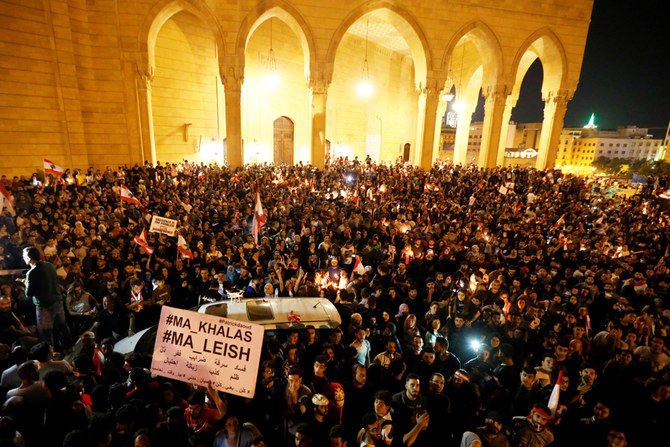


by newsweek.com – JAMES CROWLEY — Amnesty International has issued a demand to Lebanese forces that they cease the use of excessive force on peaceful protesters in Beirut. The human rights organization stated in a press release Saturday that Lebanon security forces were beating protesters, chasing them at gunpoint, and using large amounts of tear gas on crowds that had gathered in major cities to protest political corruption and call for economic and social reforms. Protests in Lebanon began in early October, with many moved to act by the country’s growing economic crisis, trash pileup, and failing power grid. Security forces began to break up protesters, after Lebanese Prime Minister Saad Hariri gave his opponents 72 hours to find a solution to the country’s economic crisis, as CNN reported. Many protesters have called for Hariri’s removal. Lynn Maalouf, Amnesty International’s Middle East research director, said in the statement: “We call on the Lebanese authorities to respect the right of protesters to freedom of peaceful assembly and investigate the excessive use of tear gas as well as the beatings and harassment at gunpoint of protesters that took place last night.”
She also remarked: “Promises by government officials to address protesters’ grievances ring terribly hollow and deceitful when security forces are given free rein to prevent the Lebanese people from voicing their anger in what was until then a largely peaceful manner.” Maalouf called the security force’s actions not just an abuse of force, but also a violation of the people’s right to a peaceful protest: “The intention was clearly to prevent protesters gathering – in a clear violation of the right to peaceful assembly.” The organization reported several accounts of violence from protesters, including stones and tear gas bombs being thrown at protesters resting in tents Another protester told Amnesty International: “Army forces followed us and they started hitting and arresting whoever they laid hands on. We were all peaceful protesters. They were hitting people on their heads and bodies with their hands, rifles and batons,” following the entrance of army vehicles to evacuate the area.
According to Amnesty International, over 60 protesters were hospitalized and 70 were arrested, despite the protest being peaceful prior to authorities’ use of excessive force. Maalouf stated that authorities must aim to “reduce tension” rather than exercise force. She also demanded an investigation into the authorities that used excessive force against the protesters. “The authorities must also signal their commitment to respecting peaceful protest by immediately and effectively investigating all report arbitrary and abusive force against protesters and allegations of ill-treatment of those arrested.”
Geagea Announces LF’s Resignation from Government
by Naharnet — The Lebanese Forces quit Lebanon’s coalition government Saturday as tens of thousands of people took to the streets for a third day of protests against tax increases and official corruption. After protesters marched in Beirut, Tripoli and other cities across Lebanon, LF leader Samir Geagea said his party’s four ministers were resigning from the government. “We are now convinced that the government is unable to take the necessary steps to save the situation,” said Geagea. “Therefore, the bloc decided to ask its ministers to resign from the government.” The protesters took to the streets despite calls for calm from politicians and dozens of arrests on Friday. Many waved billowing Lebanese flags and insisted the protests should remain peaceful and non-sectarian.
The demonstrators are demanding a sweeping overhaul of Lebanon’s political system, citing grievances ranging from austerity measures to poor infrastructure. They have blocked main roads and threatened to topple the country’s fragile coalition government. Most Lebanese politicians have uncharacteristically admitted the demonstrations are spontaneous, rather than blaming outside influences. Demonstrators in Beirut and other areas celebrated the news of the LF’s resignation, calling on other blocs to leave the government. In Tripoli, they let off fireworks. “I am thinking maybe it’s better all the government resign,” said one protester, 24-year-old Ali. “I am thinking maybe it’s better to go to another election as people already woke up.”
Saturday evening, thousands were packed for a third straight night into the Riad al-Solh Square in central Beirut, despite security forces having used tear gas and water cannons to disperse similar crowds a day before. The demonstrations first erupted on Thursday, sparked by a proposed 20 US-cent tax on calls via messaging apps such as WhatsApp. Such calls are the main method of communication for many Lebanese and, despite the government’s swift abandonment of the tax, the demonstrations quickly swelled into the largest in years.
Prime Minister Saad Hariri has given his deeply divided coalition until Monday evening to give back a reform package aimed at shoring up the government’s finances and securing desperately needed economic assistance from donors. He held a series of meetings Saturday regarding the situation, NNA said. The promised austerity moves are essential if Lebanon is to unlock $11 billion in economic assistance pledged by international donors last year. Growth has plummeted in recent years, with political deadlock compounded by the impact of eight years of war in neighbouring Syria. Lebanon’s public debt stands at around $86 billion — more than 150 percent of gross domestic product — according to the finance ministry.



